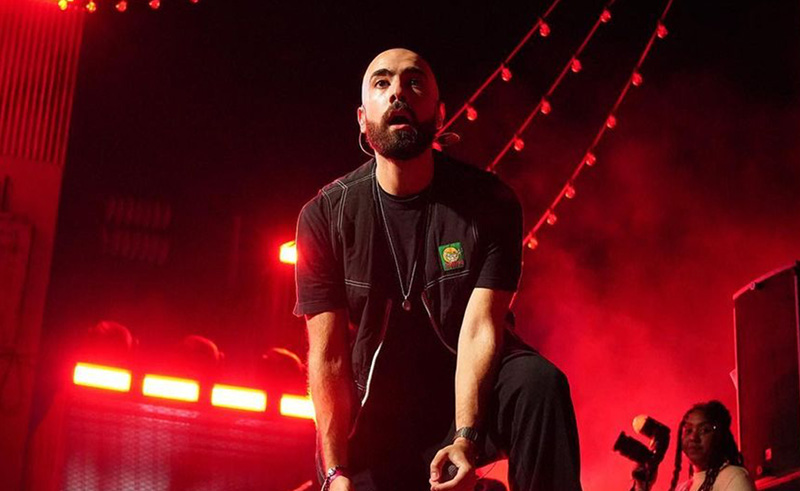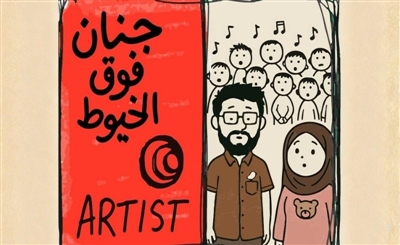Saüd: The Brij Entertainment Founder Championing Saudi's Hip Hop Scene
In this exclusive interview, producer and Brij Entertainment founder Saüd gives us a glimpse of Saudi Arabia's growing music industry.

Saud Al Turki, AKA Saüd, is a Saudi Arabian producer and label-head. Founder of Brij Entertainment, Saüd aims to connect Saudi Arabian music makers with fans from around the region by - as the name suggests - bridging the gap between contemporary music and culture. Brij Entertainment is home to regional talents who offer a unique fusion of R&B and hip-hop, while trying to appeal to a wider regional audience.
Saüd started the label in 2017, with Brij having been originally located in Los Angeles. In 2018, the label moved operations to Saudi Arabia, in light of the kingdom’s recent support of arts and culture.
The label aims to help artists thrive and achieve their potential by implementing intensive growth campaigns that focus on one artist at a time, as opposed to needlessly filling up a crowded roster.
In an exclusive interview with SceneNoise, Saüd takes us behind the curtain to show us the inner works of the music scene in Saudi Arabia.
How did Brij Entertainment come to be?
Brij started simply as a means for me to drop my music. I started the label to legitimise my position in the industry. A few years into the venture, we’ve come to build a name for ourselves, with a group of local artists working with Brij. We think of ourselves as a boutique label, taking in a small number of artists to focus all of our resources on. That way, you ensure that you provide the proper attention needed for every single release. But regardless of what project we take on, we’re just trying to play our role in the music scene by setting a high standard of quality.
What made you decide to move operations back to Saudi Arabia?
I felt like the music scene in Saudi Arabia had all of the elements needed for success, but it just needed the right care and attention to thrive. The regional music scene is very different from that of LA. There, it’s much more oversaturated, with one too many artists competing to break through.
What workflow changes have resulted from your relocation?
After moving back to Saudi Arabia, we’ve been trying to make the best of both worlds. We do this by combining the expertise of established international labels and distributors, and applying that workflow and approach to support rising local talent. There’s no denying that Saudi Arabian artists have the talent, and it’s only a matter of time until we have our time in the spotlight.
Who do you have working with Brij Entertainment?
Currently, we’re working with a handful of artists with some exciting releases coming up soon. We are working with R&B artists such as Sudanese, Saudi-based artist Zii, and rising Saudi artist Hajaj. We’ve also just signed with Pre kai ro from Egypt, who mixes R&B and hip-hop in a unique style. I release music through the label as well, where I make compilation albums as a producer.
How does the music scene in Saudi Arabia compare to that of Egypt?
Egypt has surpassed everyone in the region by finding its own sound, (referring to the blend of shaabi and trap), and the youth actually consume local media, which is what we're trying to establish here in Saudi Arabia. Here, people still look outside of the country for music, since we’ve only recently opened up to the idea of supporting local talent.
How do you think your music is received among the youth of Saudi Arabia?
I don’t think my music is seen as “Saudi” enough. I’m trying to find that perfect blend of Arabic and English sonics, but if you ask me if it speaks to the Saudi youth, I would personally say “not yet.” That’s what we’re working towards: finding that authentic sound that the people of the country can connect with, that also speaks to us as artists. Ultimately, we’re trying to build a community that will grow into a proper scene, and eventually, into a fully developed industry.
How do you think that the role of a record label has changed in today’s landscape?
The business model of labels has changed. It used to end at record sales, but now it ends at ticket sales. This is why we treat each and every artist as a stand-alone brand with a specific target audience. We want our artists to grow into figures that people would like to buy merchandise for, so we try to be more relatable than anything.
How has the presence of streaming services like Anghami and Spotify impacted your work?
While streaming services are definitely changing the game, it’s still all about the music at the end of the day. It’s easy to forget that there are humans behind these editorial playlists, and that they still need to connect with your music on some level.
What have you learned from working with major distribution companies?
We have had a great partnership with EMPIRE, who helped us figure out how and when to release. We used to be a bit more impulsive, but we now realise that it has to be a little more calculated than just dropping a record and hoping for the best.
How do you go about collaborating with other artists outside of the label?
For my first two albums, I was looking to collaborators from abroad. But these days, I’m working with people from around the region. As far as I’m concerned, it’s an obligation for me to collaborate with MENA artists and to stay aware of the different output coming out of countries like Sudan, Libya, and Tunisia. There’s fresh and interesting music coming out every day from all around the region.
- Previous Article test list 1 noise 2024-03-13
- Next Article Adriatique & Cercle Host Electronic Music Event at Hatshepsut Temple
Trending This Month
-
Nov 24, 2025






















